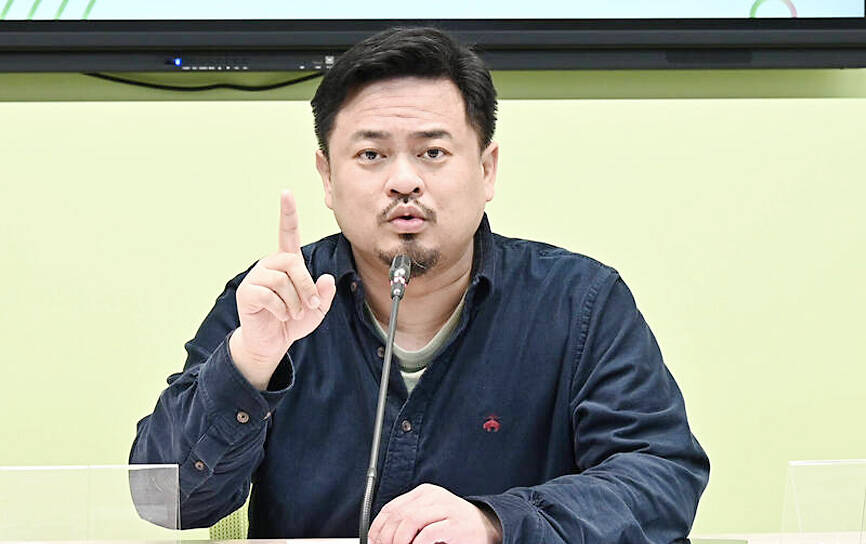Staff reporters, with staff writer
Pan-green politicians yesterday slammed Taiwan People’s Party (TPP) presidential candidate Ko Wen-je’s (柯文哲) misleading comments about COP28, after the former Taipei mayor claimed that tripling nuclear power was a consensus reached at the climate conference.
“The most important conclusion in the past few days [at COP28] is that nuclear energy should be increased three times by 2050, using 2020 as a baseline,” Ko wrote on Facebook on Tuesday.

Photo: Taipei Times file
TPP Legislator Cynthia Wu (吳欣盈), Ko’s running mate, is attending the conference in Dubai.
COP28 members pledged to triple renewable energy while a smaller group of 22 countries agreed to triple nuclear power in a bid to meet their climate targets, according to a Reuters report published on Saturday last week.
Japan was one of the countries committed to surging nuclear power despite being on the earthquake belt like Taiwan, Ko said, adding that small modular reactor technology could transform the energy sector.
Small modular reactors and extending operational nuclear plants’ service life should be part of the nation’s strategy to reach net zero carbon emissions, he said.
Democratic Progressive Party Legislator Hung Sun-han (洪申翰) on a Facebook post said: “There is nothing more shameful than using the name of science to spread lies.”
“The 110 countries attending COP 28 achieved a consensus to triple renewable energy and to double energy efficiency,” he wrote, adding: “This is not at all what Ko described.”
Tripling nuclear power by 2050 is a pledge from a minority of participants and not the “conclusion” of the entire conference, Hung said.
These countries pledged to triple nuclear power to attract international bank loans, which Ko untruthfully construed as a COP28 mandate to build nuclear plants, he said.
“This is a textbook case of spreading falsehood,” Hung said.
Vice President William Lai (賴清德), The Democratic Progressive Party (DPP) presidential candidate, anticipated the COP 28 findings and his team has made deep energy retrofit plans to address energy waste in Taiwan, he added.
Separately, Taiwan Statebuilding Party Chairman Wang Hsing-huan (王興煥) said Ko’s claims were a misrepresentation of the facts, adding that the TPP chairman’s remarks proved that he is “irrational, unscientific and impractical” about energy policy.
Ko was an opponent of nuclear energy when he ran against the Chinese Nationalist Party’s (KMT) Ting Shou-chung (丁守中) for Taipei mayor in 2014, he said, adding that Ko at the time called the latter a “political opportunist” for flip-flopping on the issue.
Ko’s journey from being against nuclear energy to supporting it and the service extension of all operational plants in the nation showed the TPP to be “a populist party that has no guiding ideals,” Wang said.
Since the TPP issued no road map for achieving net zero, Wu’s climate conference trip was little more than an exercise in empty performative politics, he said.
Ko’s comments are irresponsible as the view that nuclear energy is a form of green energy remains disputed, said Lim Hak-yan (林學淵), the deputy secretary-general of Taiwan Environmental Protection Union.

‘DENIAL DEFENSE’: The US would increase its military presence with uncrewed ships, and submarines, while boosting defense in the Indo-Pacific, a Pete Hegseth memo said The US is reorienting its military strategy to focus primarily on deterring a potential Chinese invasion of Taiwan, a memo signed by US Secretary of Defense Pete Hegseth showed. The memo also called on Taiwan to increase its defense spending. The document, known as the “Interim National Defense Strategic Guidance,” was distributed this month and detailed the national defense plans of US President Donald Trump’s administration, an article in the Washington Post said on Saturday. It outlines how the US can prepare for a potential war with China and defend itself from threats in the “near abroad,” including Greenland and the Panama

A magnitude 4.9 earthquake struck off Tainan at 11:47am today, the Central Weather Administration (CWA) said. The hypocenter was 32.3km northeast of Tainan City Hall at a depth of 7.3km, CWA data showed. The intensity of the quake, which gauges the actual effect of a seismic event, measured 4 in Tainan and Chiayi County on Taiwan's seven-tier intensity scale, the data showed. The quake had an intensity of 3 in Chiayi City and County, and Yunlin County, while it was measured as 2 in Kaohsiung, Nantou County, Changhua County, Taitung County and offshore Penghu County, the data showed. There were no immediate reports of

The Chinese Nationalist Party (KMT) is maintaining close ties with Beijing, the Democratic Progressive Party (DPP) said yesterday, hours after a new round of Chinese military drills in the Taiwan Strait began. Political parties in a democracy have a responsibility to be loyal to the nation and defend its sovereignty, DPP spokesman Justin Wu (吳崢) told a news conference in Taipei. His comments came hours after Beijing announced via Chinese state media that the Chinese People’s Liberation Army’s Eastern Theater Command was holding large-scale drills simulating a multi-pronged attack on Taiwan. Contrary to the KMT’s claims that it is staunchly anti-communist, KMT Deputy

RESPONSE: The government would investigate incidents of Taiwanese entertainers in China promoting CCP propaganda online in contravention of the law, the source said Taiwanese entertainers living in China who are found to have contravened cross-strait regulations or collaborated with the Chinese Communist Party (CCP) could be subject to fines, a source said on Sunday. Several Taiwanese entertainers have posted on the social media platform Sina Weibo saying that Taiwan “must be returned” to China, and sharing news articles from Chinese state media. In response, the Mainland Affairs Council (MAC) has asked the Ministry of Culture to investigate whether the entertainers had contravened any laws, and asked for them to be questioned upon their return to Taiwan, an official familiar with the matter said. To curb repeated